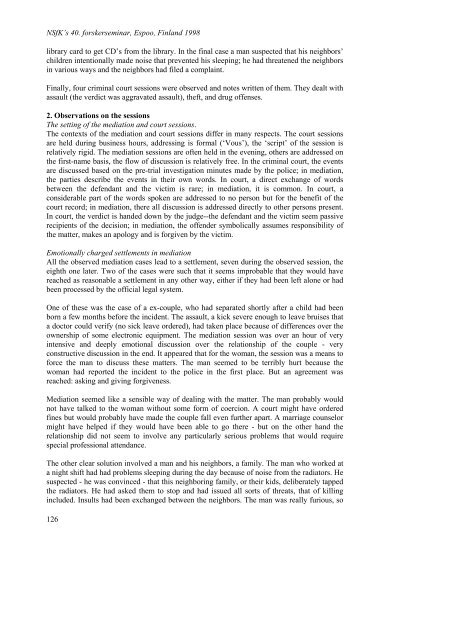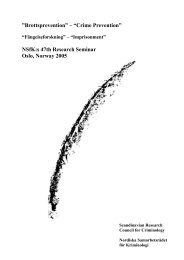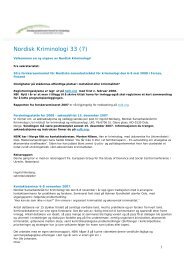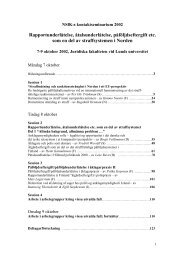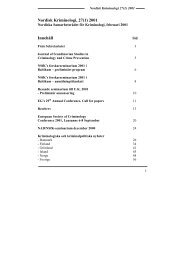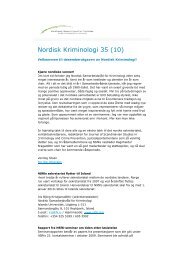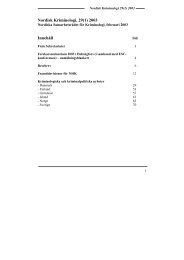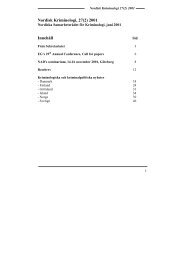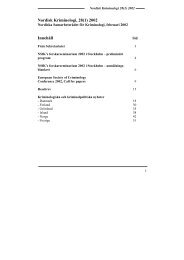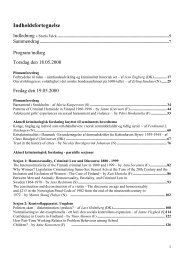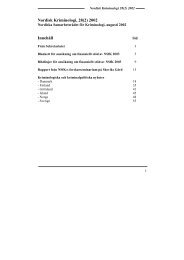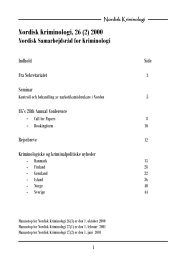Organised Crime & Crime Prevention - what works? - Scandinavian ...
Organised Crime & Crime Prevention - what works? - Scandinavian ...
Organised Crime & Crime Prevention - what works? - Scandinavian ...
You also want an ePaper? Increase the reach of your titles
YUMPU automatically turns print PDFs into web optimized ePapers that Google loves.
NSfK’s 40. forskerseminar, Espoo, Finland 1998<br />
library card to get CD’s from the library. In the final case a man suspected that his neighbors’<br />
children intentionally made noise that prevented his sleeping; he had threatened the neighbors<br />
in various ways and the neighbors had filed a complaint.<br />
Finally, four criminal court sessions were observed and notes written of them. They dealt with<br />
assault (the verdict was aggravated assault), theft, and drug offenses.<br />
2. Observations on the sessions<br />
The setting of the mediation and court sessions.<br />
The contexts of the mediation and court sessions differ in many respects. The court sessions<br />
are held during business hours, addressing is formal (‘Vous’), the ‘script’ of the session is<br />
relatively rigid. The mediation sessions are often held in the evening, others are addressed on<br />
the first-name basis, the flow of discussion is relatively free. In the criminal court, the events<br />
are discussed based on the pre-trial investigation minutes made by the police; in mediation,<br />
the parties describe the events in their own words. In court, a direct exchange of words<br />
between the defendant and the victim is rare; in mediation, it is common. In court, a<br />
considerable part of the words spoken are addressed to no person but for the benefit of the<br />
court record; in mediation, there all discussion is addressed directly to other persons present.<br />
In court, the verdict is handed down by the judge--the defendant and the victim seem passive<br />
recipients of the decision; in mediation, the offender symbolically assumes responsibility of<br />
the matter, makes an apology and is forgiven by the victim.<br />
Emotionally charged settlements in mediation<br />
All the observed mediation cases lead to a settlement, seven during the observed session, the<br />
eighth one later. Two of the cases were such that it seems improbable that they would have<br />
reached as reasonable a settlement in any other way, either if they had been left alone or had<br />
been processed by the official legal system.<br />
One of these was the case of a ex-couple, who had separated shortly after a child had been<br />
born a few months before the incident. The assault, a kick severe enough to leave bruises that<br />
a doctor could verify (no sick leave ordered), had taken place because of differences over the<br />
ownership of some electronic equipment. The mediation session was over an hour of very<br />
intensive and deeply emotional discussion over the relationship of the couple - very<br />
constructive discussion in the end. It appeared that for the woman, the session was a means to<br />
force the man to discuss these matters. The man seemed to be terribly hurt because the<br />
woman had reported the incident to the police in the first place. But an agreement was<br />
reached: asking and giving forgiveness.<br />
Mediation seemed like a sensible way of dealing with the matter. The man probably would<br />
not have talked to the woman without some form of coercion. A court might have ordered<br />
fines but would probably have made the couple fall even further apart. A marriage counselor<br />
might have helped if they would have been able to go there - but on the other hand the<br />
relationship did not seem to involve any particularly serious problems that would require<br />
special professional attendance.<br />
The other clear solution involved a man and his neighbors, a family. The man who worked at<br />
a night shift had had problems sleeping during the day because of noise from the radiators. He<br />
suspected - he was convinced - that this neighboring family, or their kids, deliberately tapped<br />
the radiators. He had asked them to stop and had issued all sorts of threats, that of killing<br />
included. Insults had been exchanged between the neighbors. The man was really furious, so<br />
126


